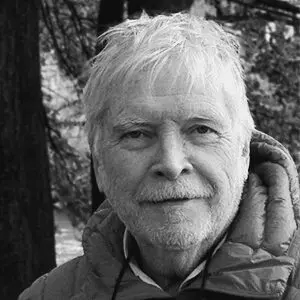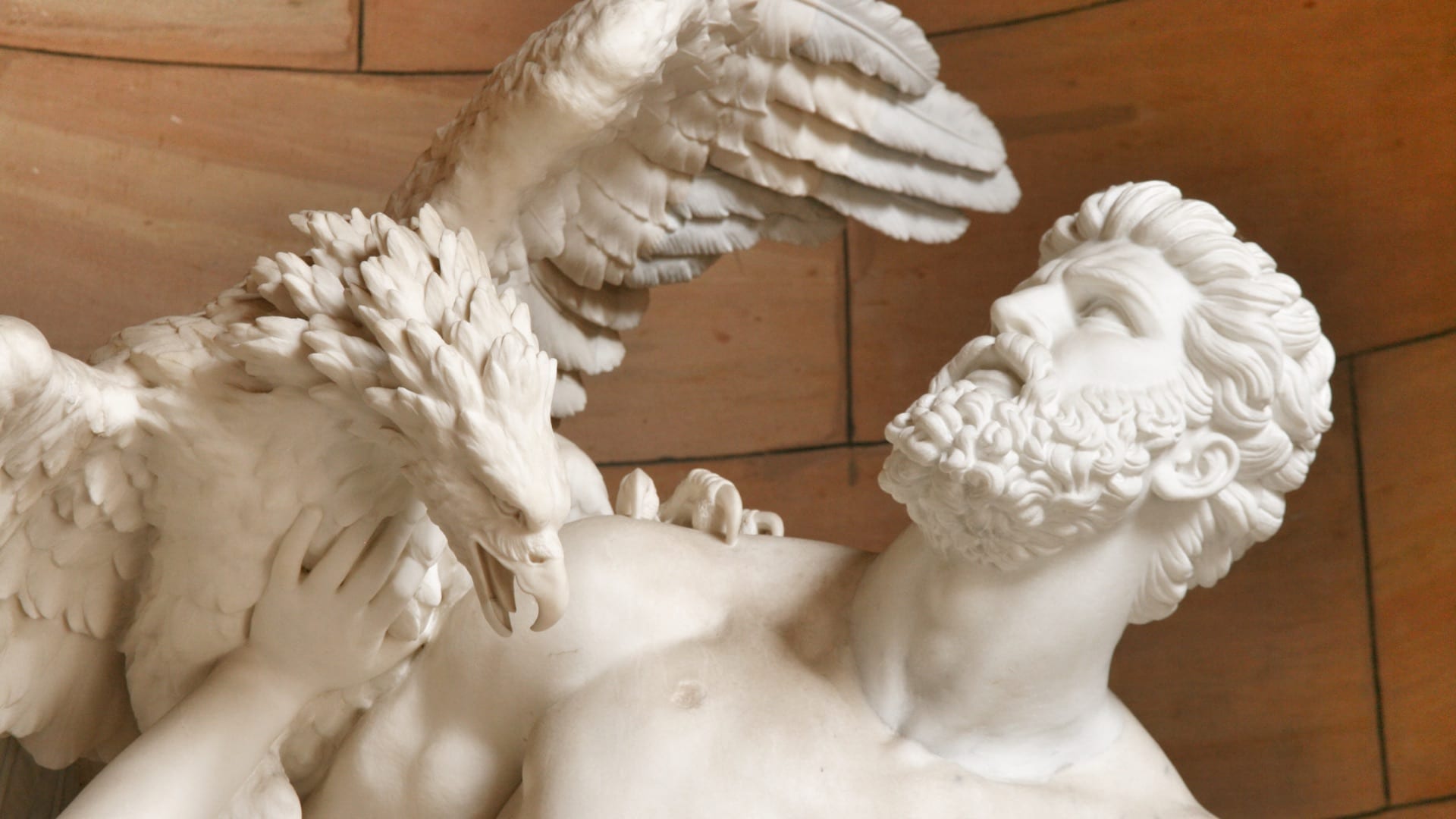

This is the sixth blog post in the series Sixteen Psychological Reflections on COVID-19 by Robert Romanyshyn
Victor Frankenstein, as a modern Prometheus, erases the boundary between the Gods and humanity. In this boundary violation, he follows the track of modern science, whose origins lie in the mid 15th century with the artistic development of linear perspective vision. In this regard, the fictional character of Victor Frankenstein does what the historical figure Galileo did when, looking through his telescope, he erased the boundary between the uncorrupted heavenly sphere and the corrupted sphere of the earth. He did it also in church when, counting his pulse beat to time the swinging sacred lamp, he created the law of pendulum motion. Consider also what happens to Angels at the vanishing point of linear perspective art. Between the depicted Angel from the 12th to even the 16th century, their majestic otherness alongside us increasingly diminishes until in Love for Sale by Joseph Wien in the 19th century they have become chubby cherub icons of human sentimentality.
Boundary crossings as we placed ourselves outside and above nature, as new lords of creation!
Now COVID-19, as was SARS, MERS, HIV, is a new version of crossing boundaries as we are erasing the line between animals and humans, establishing the conditions for these viruses to cross-species. COVID-19 is a sign of the cost of this violation. We are prophetically dreaming Victor Frankenstein’s Promethean dream and experiencing the fate of Prometheus as mandated by the Gods. Like the mythic Prometheus, who brought the gift of fire to humans, was chained to a rock for erasing the boundaries between the gods and humanity, COVID-19 and its mandated quarantines are the rock of our Promethean wound, fixing all of us in place.
The COVID-19 pandemic is our global wound. If we dare to stay with the wound; if we dare to resist leaping ahead to the moment when it is eradicated; if we even allow the whisper that comes on the wind, and with every breath we take, to inspire us, then perhaps we might begin to sense that the world as we have known it is ending, and that tomorrow will not be a return to business as usual.
The pandemic crisis is not only a danger–which it is!—, it is also an opportunity—which it can be! We see this happening in the ways in which social media platforms like Zoom, Skype, and others are responding to our basic human need as social beings to be in ‘touch’ with others at a safe distance. But so safe that such media tools erase another boundary, the fundamental boundary of space. We might well consider if the COVID-19 pandemic is the other side of this wondrous creation of digital space where one can be anywhere and everywhere while actually being nowhere. We might wonder if the technology of boundary-crossing that has made the pandemic possible is also the technology that has created a digital Utopia, literally a no-where place.
Do our inventions create the world which they perhaps do not even imagine?
Are we living out Victor Frankenstein’s Promethean dream without realizing it?
Is the opportunity that this technology also offers the danger that is leading us toward the nightmare side of this dream?
It can be and will be if we stay asleep. The tools we use also begin to use us and begin to shape a world that becomes increasingly familiar and normal. When the only tool you have is, for example, a hammer, the world becomes a nail!
Living in the digital world not only changes our sense of space, but it is also calling attention to the unquestioned sense of time that has shaped our economic and political ideologies as a line of progress, as a line of increasing growth where, as we imagined, not even the sky was the limit. The fantasy of continuous growth is fast becoming unsustainable. Infinite progress with finite resources is looming as an ecological catastrophe.
Indeed, the Covid-19 crisis is also a climate crisis. They are not separable. The death that Covid-19 brings is also the death of nature. Every personal death is a microscopic experience of the macroscopic experience of the dying of the natural world. In this regard, Covid-19 is a wakeup call to recognize how our
technologies exploit the natural world as a resource for our use and abuse, to become aware that our technologies allow us to imagine ourselves as apart from nature and forget we are a part of the natural world.
Suppose, however, that in the face of this possible disaster, we pause long enough to remember that before the boundary between the heavenly world of the sacred and the world of mortals was erased with the origins of our scientific-technological world view, the sky’s horizon was a limit. Before the erasure of that boundary, time had a seasonal quality and attuned us to the rituals of the seasons. Time was not a line. It was a spiral of turnings and re-turnings in which the winter dying of the natural world was the seed of the coming spring. It was a way of being in time in which every present was a re-turning to what was as a turning to what will be. A spiral of time not as a flat circular repetition of the same, but a re-turning of what was to another level, a circle stretched vertically between the sky above our heads and the ground beneath our feet, a circle expanded in-depth giving us our place between the sacred and the profane, between, as the poet Rilke notes, the Angel and the Animal, our place which he both laments and praises in his Duino Elegies.
Erasing boundaries, living without limits, we have collapsed that vertical depth of time, unwinding the spiral and smoothing it out into a line of progress. We have lost the sense of who we are, our sense of place between the above and the below. There are no Angels anymore and no Devils either. There is no heaven, nor is there a hell as measures of our Promethean dreams. There are only our own inner demons that are haunting us in the guise of the monsters we make when we act as if we are the measure of ourselves, lords of creation.
COVID-19! A collective symptom reminding us that our time as flawed gods and the world we have created are ending.
Enjoy all the essays in the series Sixteen Psychological Reflections on COVID-19 by Robert Romanyshyn.

Robert Romanyshyn
Robert D. Romanyshyn is an Emeritus Professor of Clinical Psychology at Pacifica Graduate Institute, an Affiliate Member of The Inter-Regional Society of Jungian Analysts, and a Fellow of the Dallas Institute of Humanities and Culture. He is also a Core Faculty Member at Jung Platform.
More Posts by Robert Romanyshyn3 Comments
Join the discussion and tell us your opinion.
Comments are closed.
I look forward to every Post by Robert Romanyshyn. They’re always food for thought, and even better, a feast for the imagination. Covid… yes, our newest Frankenstein…. a symptom ‘too vital to forget, too painful to remember’…. Frankenstein, the Doctor as a Monster, the Monster as a Doctor, as the Healer. As Hillman used to say, ‘in your symptom is your soul’. Out Soul, our Collective Psyche, cursed, blessed …. blessed by this dread Disease…. blessed, if we can can see it as Mary Shelley’s Frankenstein, the novel, the story, that begins and ends with what Auden loved as ‘ Northernness’ …. ‘the wolves running in the evergreen forests’ of his eulogy for Yeats. George Kennan, author, in the literal sense, of the country’s Cold War Policy of Containment — he too a keen a votive admirer of the North… the North Pole as Symbol, as Eliot’s ‘Still Point’, the Occult Center-Hub-Axis of the world In so much Esoterica, Sufi and otherwise as Henry Corbin shows in his iconic book, Man of Light… ‘Occult’ because Occulted (Gilbert Durand)…. Covid-Frankenstein…. in the ice, on an ice floe drifting North, emissary-ambassador, invitation, Angelos, messenger, calling us, recalling, calling us to recall us to the North, Northernness, as the Mundus Imaginalis, a call paradoxically back to the earth, to all things as full of gods, to microcosm as macrocosm, to the Book of Nature, to the Ovid concealed in Covid, Martin Luther’s surety that the Gospel is also written in the meadows, flowers and trees…. No one else of whom I’m aware has read Mary Shelley’s Frankenstein as the Book of Revelation that it is for Techno-Digital humanity …. No one else but Robert Romanyshyn which singularizes his work as ‘must-read.’ Thank you.
I am awakened to the thought that our godlike erasing of boundaries with technology our plague is reminding us that: “our time as flawed gods and the world we have created are ending.” In a way, it makes me feel that even as our technology offers us a way to over-populate this planet, it also creates us as food for viruses. I am truly looking forward to Robert Romanyshyn’s further reflections as this series proceeds.
Indeed, the Covid-19 crisis is also a climate crisis. They are not separable. The death that Covid-19 brings is also the death of nature. Every personal death is a microscopic experience of the macroscopic experience of the dying of the natural world. In this regard, Covid-19 is a wakeup call to recognize how our
technologies exploit the natural world as a resource for our use and abuse, to become aware that our technologies allow us to imagine ourselves as apart from nature and forget we are a part of the natural world.
I copy this piece of your fine insights, Robert.
A couple of observations: Knowing you as long as I have and familiar with your recurring deep themes, I love how you continue to cycle back and see what you have thought in the past with how the present-future is also alive in them now.
The second observation on breaking boundaries; the horrific images of our capital building overrun by marauders, violators of our sustained mythos, made Sandy and me and hundreds of millions around the globe sick to our stomachs.
Here, false beliefs rupture boundaries and trust. It is yet another pandemic, the pandemic of panic in the face of being uncertain what to believe anymore.
Thugs turned this secular temple into a den of destroyers. It is a moment as big as 911; it has wounded us with a scar that will never be erased. Your fine #6 took me to yesterday and tied it into reading your posting today. Many thanks. More soon. Dennis